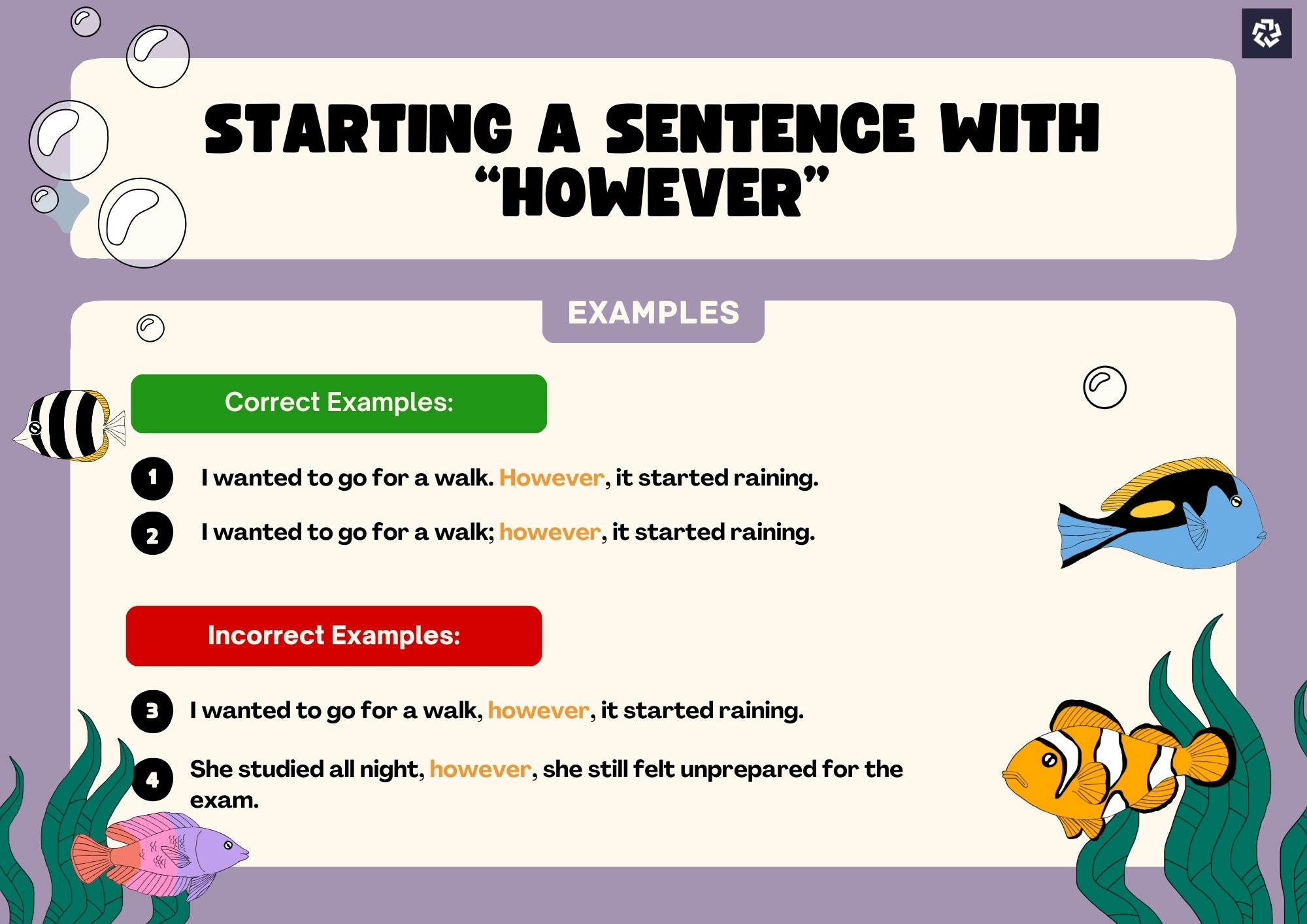Can You Start a Sentence with However?
Yes, you can start a sentence with “however”! Learn how to use it correctly and the common grammar mistakes to avoid in professional writing.
Yes! You definitely can. In fact, “However” has use cases in the English language.
Whatever you have heard about not using “However” in the past is probably a myth.
Modern English writers—including journalists, academics, and even professional editors—begin sentences with however all the time. You just have to do it correctly.
So, in this article, I’ll clear the confusion once and for all. We’ll see when it’s appropriate to use however and how to avoid common mistakes that make it look wrong.
Is it grammatically correct to start a sentence with “However”?
It is absolutely grammatically correct to start a sentence with however.
The confusion comes from old grammar advice that discouraged starting sentences with words like but, and, or however.
In reality, there’s no grammatical rule against it. It’s all about how you punctuate and use the word.
When we start a sentence with however, it usually means “nevertheless” or “on the other hand.” It introduces contrast or a shift in thought between two sentences.
For example: “The team worked hard. However, they couldn’t meet the deadline.”
When to start a sentence with “However”
Starting a sentence with however can make your writing sound clear and professional. But only when used in the right context.
It signals contrast or transition between ideas.
So, before you start using “however” in your writing, it’s important to know when it actually fits.
1. To show contrast
If you want to present an opposing idea or a different point of view, however is the perfect word to start with.
It signals that something opposite is coming next.
For example:
- I usually enjoy working late. However, yesterday I was too tired to focus.
- The plan looked perfect on paper. However, it didn’t work out in practice.
In both examples, “however” clearly defines a contrast between two ideas.
2. To mean in whatever way or to whatever extent
“However” is also used to express the idea of “no matter how” or “in any way.”
In this case, it connects with adjectives or adverbs to show that something remains true under any condition.
Example:
- However hard he tries, he can’t beat his own record.
- However you look at it, the results are impressive.
Here, “however” adds flexibility to your sentence. It shows that the statement applies universally, regardless of the situation or degree.
Common mistakes when starting a sentence with “However”
Writers often make mistakes when beginning a sentence with however. Because it’s easy to place it incorrectly.
The most common mistakes include using a comma instead of a semicolon and creating sentence fragments (not completing a sentence).
For example:
- I wanted to go to the concert, however, I was too tired. (Incorrect punctuation)
- I wanted to go to the concert; however, I was too tired. (Correct use)
- However the weather was bad. (Fragment — incomplete thought)
- However, the weather was bad, so we still went hiking. (Complete sentence)
Avoiding these mistakes helps your writing stay professional and keep your message clear.
How to Use “However” in the middle or end of a sentence
“However” can also be used in the middle of a sentence. But in those cases, it’s usually surrounded by commas to show a shift in thought.
And if we use it at the end, it displays a contrast or adds an afterthought.
For example:
- The plan was, however, more expensive than expected. (middle position)
- We wanted to go out; we stayed home, however. (end position)
Both forms are grammatically correct. However, make sure your sentence remains clear and the transition feels natural, not forced.
Alternatives to starting with “However”
Human writing is known for its variety in sentence structures and vocabulary. AI text, however, uses repeated phrases and words.
So, if you want to keep it natural, you need to know some alternative words and phrases.
Here are a few good replacements for however:
- Nevertheless → ideal for formal writing.
Example: The plan was risky; nevertheless, it succeeded. - Still → more casual and works well in blogs or conversations.
Example: The product was expensive. Still, people loved it. - Yet → short and powerful for transitions.
Example: It looked easy. Yet, no one could solve it. - Even so → adds a touch of surprise or contrast.
Example: He had little time. Even so, he finished the project. - On the other hand → great for comparing two ideas or perspectives.
Example: Organic growth is slow. On the other hand, paid ads deliver quick results.
Try mixing these alternatives depending on your tone and audience. It’ll keep your writing more dynamic and reader-friendly.
Just like how modern AI writers do. These tools, like the AI writing generator, are trained on Natural Language Generation (NLG) technology to mimic human writing style.
It not only uses different types of sentences, but also involves alternative words to give the best version of a message.
Conclusion
Starting a sentence with “however” is completely acceptable. As long as you use it correctly and with purpose.
Your punctuation and tone must match the flow of your writing. Then you can place it at the beginning, middle, or end.
Use it wisely, and your sentences will always have balance between formality and flow.

